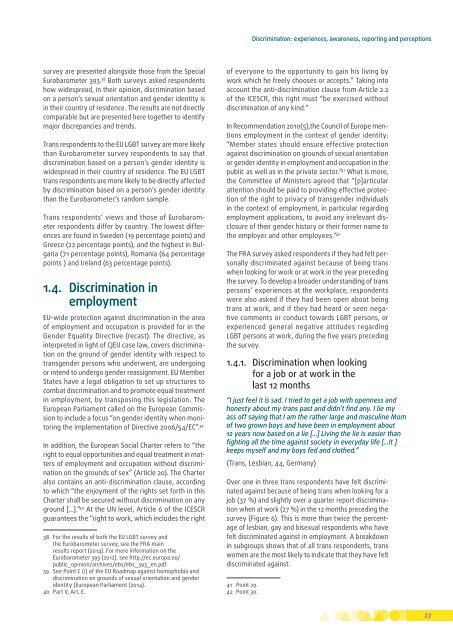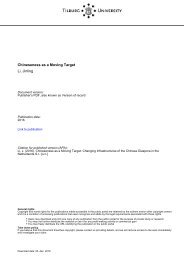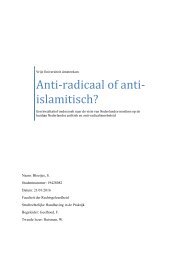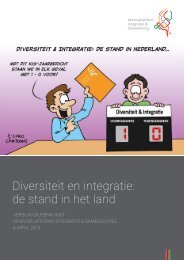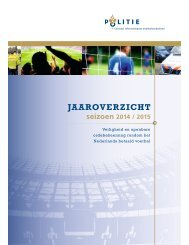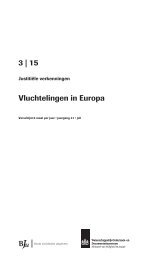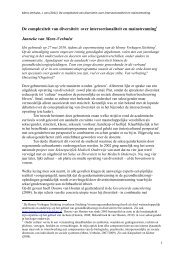fra-2014-being-trans-eu-comparative_en
fra-2014-being-trans-eu-comparative_en
fra-2014-being-trans-eu-comparative_en
You also want an ePaper? Increase the reach of your titles
YUMPU automatically turns print PDFs into web optimized ePapers that Google loves.
Discrimination: experi<strong>en</strong>ces, awar<strong>en</strong>ess, reporting and perceptionssurvey are pres<strong>en</strong>ted alongside those from the SpecialEurobarometer 393. 38 Both surveys asked respond<strong>en</strong>tshow widespread, in their opinion, discrimination basedon a person’s sexual ori<strong>en</strong>tation and g<strong>en</strong>der id<strong>en</strong>tity isin their country of resid<strong>en</strong>ce. The results are not directlycomparable but are pres<strong>en</strong>ted here together to id<strong>en</strong>tifymajor discrepancies and tr<strong>en</strong>ds.Trans respond<strong>en</strong>ts to the EU LGBT survey are more likelythan Eurobarometer survey respond<strong>en</strong>ts to say thatdiscrimination based on a person’s g<strong>en</strong>der id<strong>en</strong>tity iswidespread in their country of resid<strong>en</strong>ce. The EU LGBT<strong>trans</strong> respond<strong>en</strong>ts are more likely to be directly affectedby discrimination based on a person’s g<strong>en</strong>der id<strong>en</strong>titythan the Eurobarometer’s random sample.Trans respond<strong>en</strong>ts’ views and those of Eurobarometerrespond<strong>en</strong>ts differ by country. The lowest differ<strong>en</strong>cesare found in Swed<strong>en</strong> (19 perc<strong>en</strong>tage points) andGreece (22 perc<strong>en</strong>tage points), and the highest in Bulgaria(71 perc<strong>en</strong>tage points), Romania (64 perc<strong>en</strong>tagepoints ) and Ireland (63 perc<strong>en</strong>tage points).1.4. Discrimination inemploym<strong>en</strong>tEU-wide protection against discrimination in the areaof employm<strong>en</strong>t and occupation is provided for in theG<strong>en</strong>der Equality Directive (recast). The directive, asinterpreted in light of CJEU case law, covers discriminationon the ground of g<strong>en</strong>der id<strong>en</strong>tity with respect to<strong>trans</strong>g<strong>en</strong>der persons who underw<strong>en</strong>t, are undergoingor int<strong>en</strong>d to undergo g<strong>en</strong>der reassignm<strong>en</strong>t. EU MemberStates have a legal obligation to set up structures tocombat discrimination and to promote equal treatm<strong>en</strong>tin employm<strong>en</strong>t, by <strong>trans</strong>posing this legislation. TheEuropean Parliam<strong>en</strong>t called on the European Commissionto include a focus “on g<strong>en</strong>der id<strong>en</strong>tity wh<strong>en</strong> monitoringthe implem<strong>en</strong>tation of Directive 2006/54/EC”. 39In addition, the European Social Charter refers to “theright to equal opportunities and equal treatm<strong>en</strong>t in mattersof employm<strong>en</strong>t and occupation without discriminationon the grounds of sex” (Article 20). The Charteralso contains an anti-discrimination clause, accordingto which “the <strong>en</strong>joym<strong>en</strong>t of the rights set forth in thisCharter shall be secured without discrimination on anyground […].” 40 At the UN level, Article 6 of the ICESCRguarantees the “right to work, which includes the right38 For the results of both the EU LGBT survey andthe Eurobarometer survey, see the FRA mainresults report (<strong>2014</strong>). For more information on theEurobarometer 393 (2012), see http://ec.<strong>eu</strong>ropa.<strong>eu</strong>/public_opinion/archives/ebs/ebs_393_<strong>en</strong>.pdf.39 See Point C (i) of the EU Roadmap against homophobia anddiscrimination on grounds of sexual ori<strong>en</strong>tation and g<strong>en</strong>derid<strong>en</strong>tity (European Parliam<strong>en</strong>t (<strong>2014</strong>).40 Part V, Art. E.of everyone to the opportunity to gain his living bywork which he freely chooses or accepts.” Taking intoaccount the anti-discrimination clause from Article 2.2of the ICESCR, this right must “be exercised withoutdiscrimination of any kind.”In Recomm<strong>en</strong>dation 2010(5),the Council of Europe m<strong>en</strong>tionsemploym<strong>en</strong>t in the context of g<strong>en</strong>der id<strong>en</strong>tity:“Member states should <strong>en</strong>sure effective protectionagainst discrimination on grounds of sexual ori<strong>en</strong>tationor g<strong>en</strong>der id<strong>en</strong>tity in employm<strong>en</strong>t and occupation in thepublic as well as in the private sector.” 41 What is more,the Committee of Ministers agreed that “[p]articularatt<strong>en</strong>tion should be paid to providing effective protectionof the right to privacy of <strong>trans</strong>g<strong>en</strong>der individualsin the context of employm<strong>en</strong>t, in particular regardingemploym<strong>en</strong>t applications, to avoid any irrelevant disclosureof their g<strong>en</strong>der history or their former name tothe employer and other employees.” 42The FRA survey asked respond<strong>en</strong>ts if they had felt personallydiscriminated against because of <strong>being</strong> <strong>trans</strong>wh<strong>en</strong> looking for work or at work in the year precedingthe survey. To develop a broader understanding of <strong>trans</strong>persons’ experi<strong>en</strong>ces at the workplace, respond<strong>en</strong>tswere also asked if they had be<strong>en</strong> op<strong>en</strong> about <strong>being</strong><strong>trans</strong> at work, and if they had heard or se<strong>en</strong> negativecomm<strong>en</strong>ts or conduct towards LGBT persons, orexperi<strong>en</strong>ced g<strong>en</strong>eral negative attitudes regardingLGBT persons at work, during the five years precedingthe survey.1.4.1. Discrimination wh<strong>en</strong> lookingfor a job or at work in thelast 12 months“I just feel it is sad. I tried to get a job with op<strong>en</strong>ness andhonesty about my <strong>trans</strong> past and didn’t find any. I lie myass off saying that I am the rather large and masculine Momof two grown boys and have be<strong>en</strong> in employm<strong>en</strong>t about12 years now based on a lie [...] Living the lie is easier thanfighting all the time against society in everyday life [...It ]keeps myself and my boys fed and clothed.”(Trans, Lesbian, 44, Germany)Over one in three <strong>trans</strong> respond<strong>en</strong>ts have felt discriminatedagainst because of <strong>being</strong> <strong>trans</strong> wh<strong>en</strong> looking for ajob (37 %) and slightly over a quarter report discriminationwh<strong>en</strong> at work (27 %) in the 12 months preceding thesurvey (Figure 6). This is more than twice the perc<strong>en</strong>tageof lesbian, gay and bisexual respond<strong>en</strong>ts who havefelt discriminated against in employm<strong>en</strong>t. A breakdownin subgroups shows that of all <strong>trans</strong> respond<strong>en</strong>ts, <strong>trans</strong>wom<strong>en</strong> are the most likely to indicate that they have feltdiscriminated against.41 Point 29.42 Point 30.27


